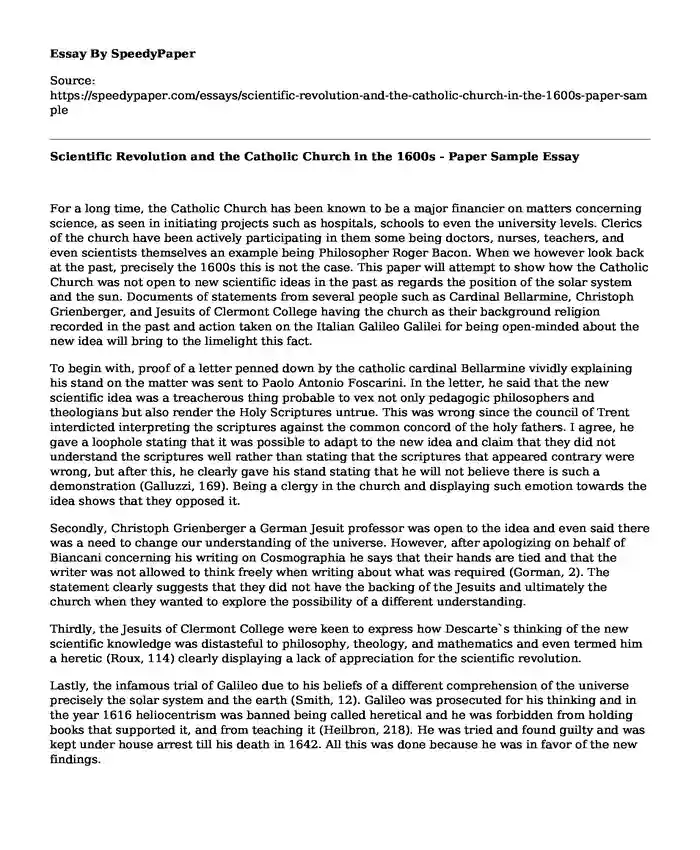
| Type of paper: | Essay |
| Categories: | Philosophy Science Church |
| Pages: | 3 |
| Wordcount: | 657 words |
For a long time, the Catholic Church has been known to be a major financier on matters concerning science, as seen in initiating projects such as hospitals, schools to even the university levels. Clerics of the church have been actively participating in them some being doctors, nurses, teachers, and even scientists themselves an example being Philosopher Roger Bacon. When we however look back at the past, precisely the 1600s this is not the case. This paper will attempt to show how the Catholic Church was not open to new scientific ideas in the past as regards the position of the solar system and the sun. Documents of statements from several people such as Cardinal Bellarmine, Christoph Grienberger, and Jesuits of Clermont College having the church as their background religion recorded in the past and action taken on the Italian Galileo Galilei for being open-minded about the new idea will bring to the limelight this fact.
To begin with, proof of a letter penned down by the catholic cardinal Bellarmine vividly explaining his stand on the matter was sent to Paolo Antonio Foscarini. In the letter, he said that the new scientific idea was a treacherous thing probable to vex not only pedagogic philosophers and theologians but also render the Holy Scriptures untrue. This was wrong since the council of Trent interdicted interpreting the scriptures against the common concord of the holy fathers. I agree, he gave a loophole stating that it was possible to adapt to the new idea and claim that they did not understand the scriptures well rather than stating that the scriptures that appeared contrary were wrong, but after this, he clearly gave his stand stating that he will not believe there is such a demonstration (Galluzzi, 169). Being a clergy in the church and displaying such emotion towards the idea shows that they opposed it.
Secondly, Christoph Grienberger a German Jesuit professor was open to the idea and even said there was a need to change our understanding of the universe. However, after apologizing on behalf of Biancani concerning his writing on Cosmographia he says that their hands are tied and that the writer was not allowed to think freely when writing about what was required (Gorman, 2). The statement clearly suggests that they did not have the backing of the Jesuits and ultimately the church when they wanted to explore the possibility of a different understanding.
Thirdly, the Jesuits of Clermont College were keen to express how Descarte`s thinking of the new scientific knowledge was distasteful to philosophy, theology, and mathematics and even termed him a heretic (Roux, 114) clearly displaying a lack of appreciation for the scientific revolution.
Lastly, the infamous trial of Galileo due to his beliefs of a different comprehension of the universe precisely the solar system and the earth (Smith, 12). Galileo was prosecuted for his thinking and in the year 1616 heliocentrism was banned being called heretical and he was forbidden from holding books that supported it, and from teaching it (Heilbron, 218). He was tried and found guilty and was kept under house arrest till his death in 1642. All this was done because he was in favor of the new findings.
Conclusion
In conclusion, from the above-documented occurrences in the past, it is clear that in the 1600s the Catholic Church was not in support of new scientific ideas. This has been proven by scholarly literature from Cardinal Bellarmine, Christoph Greenberg, Jesuits of Clermont College, and finally how Galileo was treated for his proposition on science.
Works Cited
Galluzzi, Paolo. “Images of Nature: Book or Theatre?” The Lynx and the Telescope. Brill, 2017. 169-220.
Gorman, Michael John. The Scientific Counter-Revolution: The Jesuits and the Invention of Modern Science. Bloomsbury Academic, 2020.
Roux, Sophie. “The Two Comets of 1664-1665: A Dispersive Prism for French Natural Philosophical Principles.” The Idea of Principles in Early Modern Thought. Routledge, 2017. 114-162.
Smith, Randall (2015). “A War between Science and Religion?” The Catholic Thing.
Cite this page
Scientific Revolution and the Catholic Church in the 1600s - Paper Sample. (2024, Jan 17). Retrieved from https://speedypaper.com/essays/scientific-revolution-and-the-catholic-church-in-the-1600s-paper-sample
Request Removal
If you are the original author of this essay and no longer wish to have it published on the SpeedyPaper website, please click below to request its removal:
- African Country Profile: Senegal. Free Essay in Economical Geography.
- Free Essay Sample: Sustainable Design for a House in the Tropics
- Overview of the Physics Experiment - Free Paper
- Politeness Orientation in the Linguistic Expression of Gratitude in America and Indonesia: Generation X and Y
- Literary Essay Sample: Christian Attributes in the Poetics The Wanderer and The Seafarer
- Essay Example on Ricin as Bioweapons
- Engineering: History of Computer Numerical Control (CNC) - Essay Sample
Popular categories




